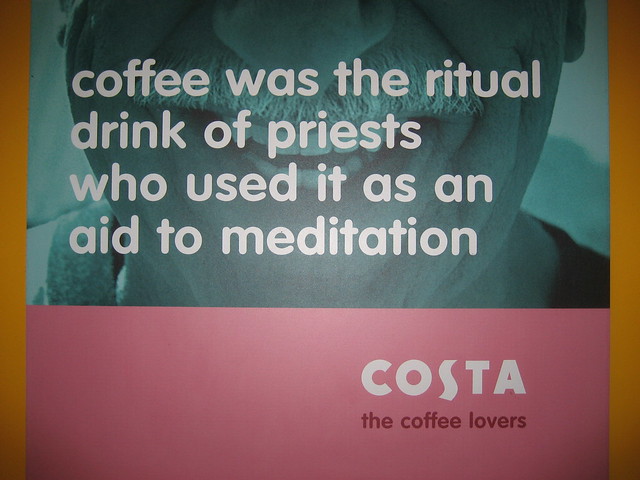
Do Our Rituals Create Us or Do We Create Them?
Are we creatures of our own rituals? Do our rituals make us who we are, or do we make them what they are?
I know people who find it impossible to function unless they do certain things in specific ways. Some of us need to begin our mornings with exactly the right type of caffeination. We may have certain routes we follow whenever we go particular places. Some of us have specific procedures for what we wear.
The dictionary tells us rituals are religious or solemn ceremonies consisting of actions performed according to a prescribed order.
Many of us have unconscious ceremonies we might not even recognize. There are things we do in certain ways every day or every week which shape our lives. Our lives feel incomplete or confused when our schedules get thrown off and we miss doing things our way.
What are our rituals? Do we have a prescribed order for any of our everyday ceremonies?
Some of us have inherited ways of performing everyday tasks from our parents or our families. People who have served in the military have learned the right ways to do things. Others of us have found ways we enjoy doing things on our own.
We think of certain religious groups when we talk about rituals, including monks and monasteries. I can feel the power of ritual when I spend spend time at the hermitage where I am a lay Oblate. The schedule and ways of doing things can feel supportive or be pressing us into practices.
My wife thinks I have quite a few rituals, and I think the same thing about her. The process of getting to know someone and becoming friends is often a matter of finding our shared rituals.
How do our rituals shape us and help us grow? Do we create them or do they create us?
Monastic Practices
Benedictine monastic communities are built on history and tradition. The fundamental rule which governs their rituals is over 1,500 years old.
While each community deals with new challenges each day in its own ways, there is a framework.
Monastic communities have worship rituals as well as other everyday rituals. Many monasteries, for example, practice what is called The Great Silence. The people in the community do not speak overnight. Silence lasts from the end of the final service of one day until after breakfast the next day.
The hermitage with which I am most familiar practices silence all the time, except in the bookstore.
Many people feel intimidated by the need to be still until they experience it for themselves. Being a fairly outgoing person, I was anxious about being still before my first retreat. I was surprised to find stillness supportive and comforting. There is no need to find something to say, to make other people happy, or even to remember people’s names. Nonverbal communication works well.
Being still can help us become more open to the other rituals of the community. I have learned to chant by listening and paying attention to the chanting around me.
Ritual stillness helps me relax and rest and sit in the beauty of the hermitage.
Having been a lay Oblate at the hermitage for several years, I am beginning to see how it is shaping me.
I carry the rhythm of the hermitage with me when I leave at the end of my retreat each year. It shapes the ways I pray and worship wherever I am. The everyday practices also shape how I experience and respond to life within me and around me.
Each of us creates our own rituals and they create us.
Creating Our Own Rituals
We choose, whether consciously or unconsciously, to create our own rituals.
When we pay attention to the ways we live our lives, the practices we follow, we begin to understand them.
Other people may recognize our ceremonies more clearly than we can. It might help us to find someone we trust and ask them about our rituals.
For example, I have several solemn ceremonies I follow as I write. Though I have a variety of methods at my disposal, I almost always write on a laptop computer. There is a large window behind my computer which looks onto several green plants. I watch hummingbirds, along with others, fly around a large bush as I write. Some days squirrels visit me as well.
A ritual is not the same thing as a habit. The actions which become solemn ceremonies for us are the ones in which we find meaning and significance. We do not simply repeat how we live day after day.
I often do not realize I am creating a ritual until I notice the power it has in my life.
Our Practices Are Creating Us
Contemplative practices help us become more aware and mindful about the ritualistic ways we live. We see in new ways how significant the smallest details can be for us.
A friend of mine approaches carpentry as a series of solemn ceremonies. There is a ritual of striking a nail with a hammer and a ritual of measuring and sawing. Working with wood is saturated with meaning, not reduced to simply getting things done.
A ritualistic approach to carpentry creates a different kind of carpenter.
Some of us experience our work or our families the way my friend experiences carpentry. The solemn ceremonies we create are creating us.
As I include monastic rituals in my life they are at work creating, and recreating, me. My ceremonies, large and small, show me the meaning in seemingly meaningless tasks.
Our rituals are not merely our quirky ways of doing what we do. They are at work in us unveiling the meaning we find in everyday life.
We create our own rituals and they are at work creating us.
Where are our rituals showing us meaning?
Are our rituals creating us or are we creating them today?
How are our rituals shaping and being shaped by our lives this week?
[Image by nickgraywfu]
Greg Richardson is a spiritual director in Southern California. He is a recovering assistant district attorney and associate university professor, and is a lay Oblate with New Camaldoli Hermitage near Big Sur, California. Greg’s email address is [email protected].












